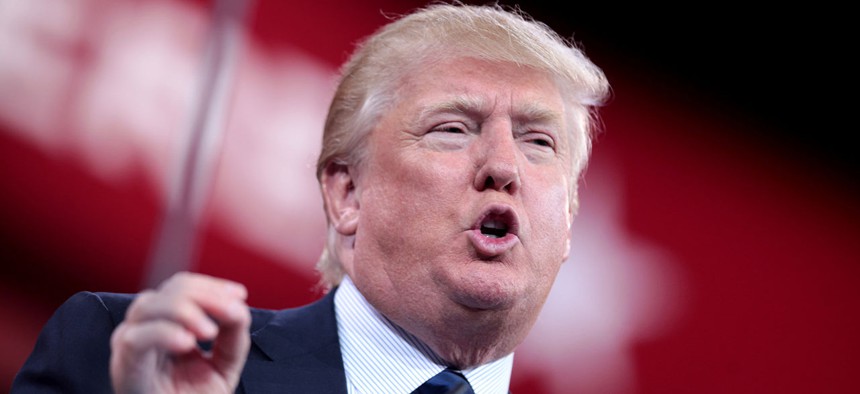
Flickr user Gage Skidmore
Donald Trump's Denial of His Reported Remarks on the Balkans
A Serbian news magazine said the GOP presidential nominee called the U.S.-led intervention “a mistake,” but his campaign said the story was a hoax.
Donald Trump, the Republican presidential nominee, is denying remarks attributed to his campaign that he called the bombing of Serbia in the 1990s “a mistake.”
“Mr. Trump never gave an interview to the Serbian weekly magazine Nedeljnikasas falsely reported by the discredited Newsweek, nor was such an interview conducted through our Indiana State Director,” Jason Miller, the Trump campaign’s senior communications adviser, said in a statement. “This was a hoax and we look forward to receiving a formal retraction and apology from all involved.”
Nedeljnik, the independent Serbian news weekly, quoted Trump as saying: “The bombing of the Serbs, who were our allies in both world wars, it was a big mistake. The Serbs are very good people. Unfortunately, the Clinton administration caused them a lot of harm, but also throughout the Balkans, where they made a mess.”
Newsweek, which first reported the comments, cited Nedeljnik’s managing editor, Marko Prelevic, as saying the interview was conducted via email correspondence with Suzanne Ryder Jaworowski, a Trump campaign senior adviser who is also campaign manager for the state of Indiana.
Prelevic also told BuzzFeed News: “We established the contact with the Trump campaign through Mr. Vladimir Rajcic, a Serbian American who is close to some aides of Mr. Trump. We asked him if we could send over some questions and after a couple of weeks got answers from Suzanne Ryder Jaworowski in an email.”
But Ryder Jaworowski also denied making the comments.
“Regarding the article about a media interview with a Serbian politician and Mr. Trump via my email, this is completely false,” she said. “I have never served as a conduit to interview Mr. Trump for anyone.”
NATO conducted airstrikes in the Balkans twice in the 1990s: in both cases, it was to stop ethnic cleansing by Serbs, first of Bosnian Muslims and then of Albanian Kosovars. After the conflict, much of the Serbian leadership of the period was tried and convicted of war crimes. The interventions, which eventually saw the breakup of Yugoslavia, were seen as a major success for the U.S. because it did not involve boots on the ground and resulted in no American casualties. The intervention also came despite strong Russian opposition in the U.N. Security Council; Russia claims a cultural kinship with Serbia and views the region as part of its sphere of influence.
Price Floyd, a former U.S. State Department official who worked on the Bosnia desk at the time, told me that the U.S. took the lead in the conflict after the then-nascent European Union couldn’t resolve the issue on its own.
“And it did make a difference: It brought about peace both in Kosovo and the region,” he said, adding: “Serbia was actually a success of U.S. foreign policy. It worked.”
The Republican nominee, who is running against President Clinton’s wife, Hillary Clinton, for the presidency, has been supported by Serb ultra-nationalists, who during a recent rally urged supporters to “Vote Trump, for the future of Serbia.”
(Image via Flickr user Gage Skidmore)






